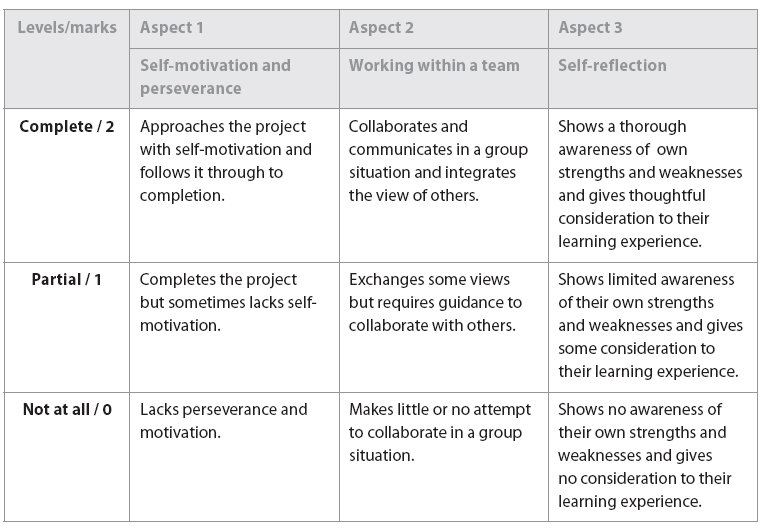Refer to the new syllabus of IB Computer Science 2012, Computer Science has moved to Group 4, instead of Group 5, which means, Computer Science will do a Group 4 Project with the other science subject: Physics, Biology and Chemistry.
The group 4 project is a collaborative activity where students from different group 4 subjects work together on a scientific or technological topic, allowing for concepts and perceptions from across the disciplines to be shared. This is to encourage an understanding of the relationships between scientific disciplines and the overarching nature of the scientific method. The project can be practically or theoretically based. Collaboration between schools in different regions is encouraged.
The group 4 project allows students to appreciate the environmental, social and ethical implications of science and technology. It may also allow them to understand the limitations of scientific study, for example, the shortage of appropriate data and/or the lack of resources. The emphasis is on interdisciplinary cooperation and the processes involved in scientific investigation, rather than the products of such investigation.
The choice of scientific or technological topic is open but the project should clearly address the group 4 aims 7, 8 and 10 of the computer science subject guide.
Ideally, the project should involve students collaborating with those from other group 4 subjects at all stages. To this end, it is not necessary for the topic chosen to have clearly identifiable separate subject components. However, for logistical reasons some schools may prefer a separate subject “action” phase
(Computer Science Guide pg. 95)
There are three steps required to do G4 Project which is, Planning, Action and Evaluation
• The planning stage could consist of a single session, or two or three shorter ones.
• This stage must involve all group 4 students meeting to “brainstorm” and discuss the central topic, sharing ideas and information.
• The topic can be chosen by the students themselves or selected by the teachers.
• Where large numbers of students are involved, it may be advisable to have more than one mixed subject group.
Action stage should last around six hours and may be carried out over one or two weeks in normal scheduled class time. Alternatively, a whole day could be set aside if, for example, the project involves fieldwork.
• Students should investigate the topic in mixed subject groups or single subject groups.
• There should be collaboration during the action stage; findings of investigations should be shared with other students within the mixed/single subject group. During this stage, in any practically based activity, it is important to pay attention to safety and ethical and environmental considerations.
The evaluation stage, is on students sharing their findings, both successes and failures, with other students. How this is achieved can be decided by the teachers, the students or jointly.
• One solution is to devote a morning, afternoon or evening to a symposium where all the students, as individuals or as groups, give brief presentations.
• Alternatively, the presentation could be more informal and take the form of a science fair where students circulate around displays summarizing the activities of each group.
Addressing aims 7 and 8 and 10
Note: Although the aims of computer science are not identical to the other group 4 subjects, it is the following group 4 aims that are referred to when describing the interdisciplinary group 4 project undertaken by all group 4 students.
Aim 7—“develop and apply the students’ information and communication technology skills in the study of science”
Aim 7 may be partly addressed at the planning stage by using electronic communication within and between schools. It may be that ICT (for example, data logging, spreadsheets, databases and so on) will be used in the action phase and certainly in the presentation/evaluation stage (for example, use of digital images, presentation software, websites, digital video and so on).
Aim 8—“raise awareness of the moral, ethical, social, economic and environmental implications of using science and technology”
The choice of topic should enable one or more elements of aim 8 to be incorporated into the project.
Aim 10 – “encourage an understanding of the relationships between scientific disciplines and the overarching nature of the scientific method.”
Types of project
While addressing aims 7, 8 and 10 the project must be based on science or its applications.
The project may have a hands-on practical action phase or one involving purely theoretical aspects. It could be undertaken in a wide range of ways.
• Designing and carrying out a laboratory investigation or fieldwork.
• Carrying out a comparative study (experimental or otherwise) in collaboration with another school.
• Collating, manipulating and analysing data from other sources, such as scientific journals, environmental organizations, science and technology industries and government reports.
• Designing and using a model or simulation.
• Contributing to a long-term project organized by the school.
Assessment
The group 4 project is to be assessed for the personal skills criterion only, and this will be the only place where this criterion is assessed. It is up to the school how this assessment takes place.
Note: The group 4 project is not to be used for the assessment of the other criteria.
Personal skills (for group 4 project assessment only)

